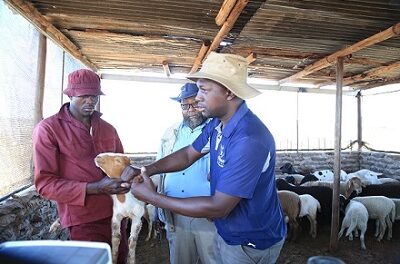Coverage of elections in accordance with the broadcasting code
By Simson Shimakeleni /
The media is not only the cornerstone of democracy, but they also play an indispensable role in the proper functioning of a democracy.
The vital role of the media as a watchdog of the democratic process and in influencing political discourse, especially during elections, is essential to democratic consolidation.
In 2018, the Communications Regulatory Authority of Namibia (CRAN) issued the Broadcasting Code for Broadcasting Licensees under Section 89 of the Communications Act, 2009.
The Broadcasting Code establishes a clear framework for how broadcasters are to be monitored and adjudicated ensuring that media practices align with the ethical standards and legal mandates as per section 90 of the Communications Act, Act 8 of 2009 (the Communications Act).
The media occupy a vital role in the advancement of democracy and should be upheld as an institution that protects democracy. Without the media, safeguarding the credibility and transparency of the electoral process would be a difficult task.
While a free and objective media can foster transparency by disseminating important electoral information, a stifled or compromised media is capable of undermining the electoral process, ultimately weakening democracy.
Part C of the Broadcasting Code sets out the manner in which media houses are expected to conduct themselves during the coverage of Elections and Referendums. A referendum is a general vote by the electorate on a single political question that has been referred to them for a direct decision as anticipated in section 119 of the Electoral Act, Act 5 of 2014 (the Electoral Act).
Namibia is set to go to the polls on the 27th of November 2024 and the 26th of September to the 24th November 2024 has been declared as an election broadcasting period.
To this end, there is an obligation on media houses to conduct themselves in a certain manner to ensure that they are transparent, impartial, and accountable in the election coverage to maintain a robust democracy in Namibia.
The obligations of broadcaster under the broadcasting code during election period
It is well known that the media sets agenda and use values such as prominence to satisfy the interest of the public. However, to curb the potential of this transpiring, the Broadcasting Code sets out the obligations of the broadcasters.
Sections 18-24 of the Broadcasting Code set out how broadcasters must conduct themselves in the Coverage of Elections and Referendums. Some of the key obligations include but are not limited to the following:
Party Election Broadcasts: Per the Electoral Calendar issued by the Electoral Commission of Namibia, nomination day is set to be proclaimed as the 26th of September 2024. The election broadcast period before the elections on 27 November 2024 will therefore run from 26 September 2024 until 24 November 2024.
Broadcasters are restricted from airing party election broadcasts outside the election broadcast period stated above. A party election broadcast is a programme, whether pre-recorded or a live event, which is broadcast free of charge or for a fee determined by the broadcaster or intended or calculated to advance the interests, beliefs or objects of any political party or candidate.
Any broadcaster choosing to air party election broadcasts must provide equal opportunities to all political parties. Further, a broadcaster who decides to broadcast a party election broadcast for a particular party must afford all other political parties a similar opportunity.
News And Current Affairs: All current affairs programmes related to the election must be balanced and impartial ensuring that there is a platform to all political perspectives.
Balance and Impartiality: Broadcasters must guarantee equitable treatment of all political entities in their coverage. This includes impartiality in editorial content and advertising time.
In making advertising time available to political parties, no broadcaster may discriminate against any political party or make or give any preference to any political party or subject any political party to any prejudice.
Party Election Broadcasts: A broadcaster broadcasting a party election broadcast contents must make available to all political parties, every day throughout the election broadcast period, four timeslots not exceeding two minutes each as a minimum.
Such broadcaster must further ensure that all party election broadcasts it airs are clearly identified and ensure that all party election broadcasts are identified or announced in a similar manner.
A broadcaster may not broadcast a political party’s party election broadcast or political advertisement immediately before or after another political party’s party election broadcast or political advertisement.
Political Advertising: Political advertisements are only permissible during the election broadcast period. A broadcaster, to whom a political advertisement is submitted by a political party for broadcast, may not edit or alter the advertisement.
A broadcaster may not reject a political party’s political advertisement without reasonable cause and in such event the broadcaster must, no longer than 24 hours after having received the political party’s political advertisement, furnish the political party concerned with written reasons for the rejection.
Polling Day Broadcasts: On polling day, broadcasters must refrain from airing any material that supports any political party or candidate. Coverage should focus solely on voting progress and logistical information.
Broadcasters can only broadcast election results after the polls close and the official results are announced by the Electoral Commission of Namibia.
Compliance and enforcement of the broadcasting code
Non-compliance with the Broadcasting Code does not go without any repercussions. CRAN plays a vital role in enforcing the Broadcasting Code and monitoring compliance under Section 90 of the Communications Act.
Should a broadcaster be alleged to have breached any of the provisions of the code, upon receiving a complaint, CRAN will request the concerned broadcaster to provide written representations regarding the alleged breach.
If a material breach is confirmed, CRAN has the authority to impose various sanctions, ranging from warnings, mandatory changes in programme, public disclosures, counter-broadcasts, suspension, or even revocation of the broadcasting license.
This rigorous enforcement mechanism ensures that broadcasters adhere to ethical standards and contribute to a fair and balanced electoral process in Namibia.
The purpose of regulating this is to ensure that media coverage of elections and referendums is regulated to be fair and impartial, contributing to a democratic and transparent electoral process in Namibia.
Upholding democracy through fair media practices
CRAN’s introduction of the Broadcasting Code marks a pivotal moment in ensuring that Namibia’s landscape supports a democratic electoral process that ensures fairness and transparency.
By setting stringent guidelines and maintaining close oversight, CRAN aims to foster an environment where all political parties receive equitable treatment which guarantees that the public has access to unbiased information, strengthening the democratic fabric of Namibia as the nation heads into future elections and referendums.
With these safeguards in place, the public can be assured that their media landscape will uphold the principles of fairness, balance, and impartiality, thereby strengthening the democratic process.
To ensure that all broadcasters adhere to the provisions relating to the Coverage of Elections and Referendums in the Broadcasting Code, CRAN calls on members of the public and political parties to report any broadcasters not complying with the Broadcasting Code for the Authority to sanction the concerned broadcaster/s accordingly.
– Mr Simson Shimakeleni is the Legal Advisor for Complaints and Enforcement at the Communications Regulatory Authority of Namibia (CRAN).







